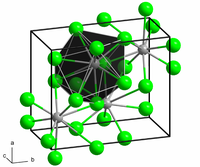二溴化钐
化合物
二溴化钐是一种无机化合物,化学式为SmBr
2。[6]它在室温下为棕色晶体。[2][3]
| 二溴化钐 | |
|---|---|

| |
| 英文名 | Samarium(II) bromide |
| 别名 | 溴化亚钐 溴化钐(II) |
| 识别 | |
| CAS号 | 50801-97-3 |
| ChemSpider | 10008489 |
| SMILES |
|
| InChI |
|
| InChIKey | AEPYKHCUOAUXAI-UHFFFAOYSA-L |
| 性质 | |
| 化学式 | SmBr2 |
| 摩尔质量 | 310.17 g/mol[1][2] g·mol⁻¹ |
| 外观 | 棕色晶体[2] |
| 熔点 | 669 °C(942 K)[2][3] |
| 溶解性(水) | 与水反应[2] |
| 磁化率 | +5337.0·10−6 cm3/mol [4][5] |
| 危险性 | |
GHS危险性符号
| |
| GHS提示词 | 警告[1] |
| H-术语 | H315, H319, H335[1] |
| P-术语 | P261, P305+351+338[1] |
| 相关物质 | |
| 其他阴离子 | 二氯化钐 二碘化钐 |
| 其他阳离子 | 二溴化铕 |
| 相关化学品 | 三溴化钐 |
| 若非注明,所有数据均出自标准状态(25 ℃,100 kPa)下。 | |
制备
编辑二溴化钐最初由P. W. Selwood于1934年用氢气还原三溴化钐合成。Kagan通过将氧化钐(Sm2O3)转化为三溴化钐,再用锂的THF悬浊液还原得到二溴化钐。Robert A. Flowers通过溴化锂和二碘化钐在THF中的化学计量比反应得到。Namy用四溴乙烷和金属钐反应,Hilmerson发现加热这两个混合物可以提高二溴化钐的产量。[7]
应用
编辑二溴化钐可以用作还原剂,但不如二碘化钐那样常见。[8]这可能是由于它只能用于少量的有机溶剂中。但它是醛、酮和交叉偶联羰基化合物的频哪醇耦合反应的有效试剂。有报道指出二溴化钐在卤代烷的存在下可以选择性地还原酮。[7]
将六甲基磷酰胺加入至二溴化钐中,它足以使亚胺还原成胺、将烷基氯化物还原为烃类。[9]然而,在二溴化钐的四氢呋喃溶液中加入六甲基磷酰胺,足以在室温下的两小时内将环己基氯转化成环己醇。[10]
如果没有引发剂,二溴化钐会还原四氢呋喃中的酮。[11]
参考文献
编辑- ^ 1.0 1.1 1.2 1.3 Samarium(II) bromide 99.95% | Sigma-Aldrich. www.sigmaaldrich.com. [2016-12-20]. (原始内容存档于2019-11-29).
- ^ 2.0 2.1 2.2 2.3 2.4 CRC Handbook of Chemistry and Physics 97th Edition. 2016-06-24: 4–83. ISBN 1-4987-5428-7 (英语).
- ^ 3.0 3.1 Haynes, William M. CRC handbook of chemistry and physics : a ready-reference book of chemical and physical data. 94th. CRC Press. 2013: 86. ISBN 9781466571150.
- ^ Haynes, William M. CRC handbook of chemistry and physics : a ready-reference book of chemical and physical data. 94th. CRC Press. 2013: 135. ISBN 9781466571150.
- ^ Lide, David R. CRC handbook of chemistry and physics : a ready-reference book of chemical and physical data 85th. Boca Raton [u.a.]: CRC Press. 2004: 147. ISBN 9780849304859.
- ^ Elements, American. Samarium Bromide SmBr2. American Elements. [2016-12-20]. (原始内容存档于2019-08-02).
- ^ 7.0 7.1 Skrydstrup, David J. Procter, Robert A. Flowers, Troels. Organic synthesis using samarium diiodide a practical guide. Cambridge: Royal Society of Chemistry. 2009: 157. ISBN 9781847551108.
- ^ Ho, Tse-Lok. Fiesers' Reagents for Organic Synthesis Volume 28. John Wiley & Sons. 2016: 486. ISBN 9781118942819.
- ^ Pecharsky, Vitalij K.; Bünzli, Jean-Claude G.; Gschneidner, Karl A. Handbook on the physics and chemistry of rare earths. Amsterdam: North Holland Pub. Co. 2006: 431. ISBN 9780080466729.
- ^ Couty, Sylvain; Baird, Mark S.; Meijere, Armin de; Chessum, Nicola; Dzielendziak, Adam. Science of Synthesis: Houben-Weyl Methods of Molecular Transformations Vol. 48: Alkanes. Georg Thieme Verlag. 2014: 153. ISBN 9783131722911.
- ^ Brown, Richard; Cox, Liam; Eames, Jason; Fader, Lee. Science of Synthesis: Houben-Weyl Methods of Molecular Transformations Vol. 36: Alcohols. Georg Thieme Verlag. 2014: 129. ISBN 9783131721310.